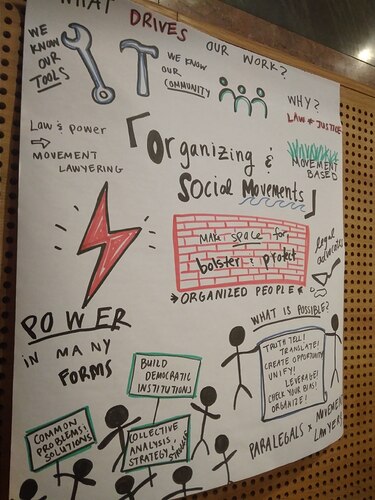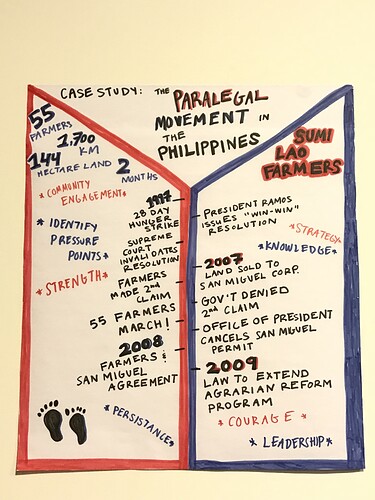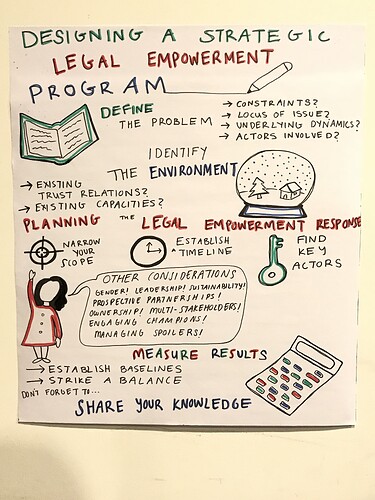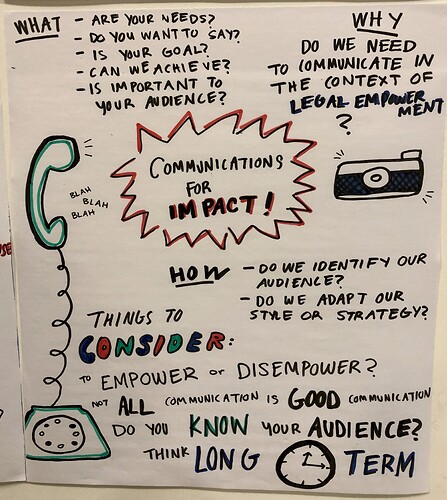Exactly, it is really legal empowernment
Hi, i had written a mail to namati regarding the course visa issues. Anxiously waiting for the reply or intimation from your side!
We will be in touch directly regarding logistics for individual participants. Thanks for your patience! 
Thank you for the reply! This program will realy go a long way in making a change in my community.
@MeenaJagannath
@leadership_course_2018_participants
Today, we started the first day of leadership course.
Session II was about ‘Organizing and Social Movements’ and we discussed about Theory of Social Change.
There were different discussion about community vs legal empowerment.
We mainly concluded that the resource of successfully movement comes when people react and ask for their lives.
Colleagues, please feel free to share your impressions from today.
What do you think about the combination of strategies which was defined by farm workers in order to reclaim their lands? In this case, what role did the law play and what role did other strategies play in gaining success?
@leadership_course_2018_faculty @leadership_course_2018_participants @leadership_course_2018_staff
I really appreciated watching the video together - it was very moving and inspiring. Also to hear Marlon’s stories and answers to questions about the experience. It’s hard to imagine this group of 55 farmers walking for two months, having set off without even having enough food to last for the trip. And in winter no less, being separated from their families during Christmas, an important holiday in the Philippines. I liked very much also the fact that all 55 farmers on the walk were representative leaders who could explain to anyone who asked the specific reasons why they were marching and their goal.
The article on rappler.com Marlon referenced is linked below - also a very interesting read about the follow-up ten years after the march took place.
The video has moved me to higher levels. DON’T FAIL BEFORE YOU COMPLETELY FAIL, that’s what I have learnt greatly as persistence paid off.
It was my nth time to watched the documentary but it still brings excitement. The story of the Sumilao farmers is very touching, inspiring and makes you hope that despite the challenges and frustrations in our legal empowerment work, we should never cease until social justice for the voiceless and marginalized is achieve.
The session with Marlon and the example of the Sumilao farmers were very inspiring. The idea of farmers’ ownership of the strategy and activities undoubtedly brings success. Justice can be achieved whenever people are encouraged and dared to take their fate into their own hands.
Walk for Land, Walk for Justice is a very inspiring video. It shows the power of persistence, effective strategizing, utilizing the media to get your message across and that we are all leaders in our own special way in the legal empowerment struggle. For me the farmers’ success was not in them reaching their final destination but in the journey. What a powerful message, that success is not necessarily defined by the outcome but by the ‘doing!’
To empower or disempower? What impactful communication can achieve for legal empowerment
There was an intense but fruitful discussion on Day 3 of the Global Legal Empowerment Leadership Course on the impact of communication to the legal empowerment work especially when communication was manipulated and used as a tool to spread lies, fear and anger. But at the end of the day, the participants agree to the truthful use of communication and that communication can be a powerful tool to achieve our objective of social justice for the voiceless and marginalised.
Great discussion on communications today! Here’s a resource I have found to be super useful in comms work. It’s US-focused, but the main takeaways are relevant more broadly:
The Opportunity Agenda, “Visions, Values, and Voice: A Social Justice Communications Toolkit” : https://toolkit.opportunityagenda.org/
Also–this tool from the same group helps you construct social justice messages: https://toolkit.opportunityagenda.org/building
Today’s sessions on the use of technology in our community work for training, communications and data collection were inspiring and innovative. This course is truly ahead-of-the-curve in terms of providing cutting edge research and information about the latest innovations in iegal empowerment. BRAVO Team!
The quality of the presenters in this course is second-to-none! The dedication of these seasoned professionals in legal empowerment to share their knowledge with the grassroots practitioners in the room is impressive. Gathered here from nearly 50 different countries, Namati and the CEU has created an impressive think-tank of legal empowerment activists working for change.
Here are some tweets from the data sessions!
https://twitter.com/PaulSixpence/status/1070248305022697474
Thanks, Lorraine! I added another tweet that I found to your post above - looks like there has been some active tweeting from the course. Really fun to read back on the tweets from the last few days - hashtag legalempowerment.
My favorite take away about the use of data from today was the notion that “Every story needs a number, every number needs a story”. It is so true that numbers make stories more real and concrete, understandable to the recipient of the story. Likewise knowing the story behind the number, that explains the number, is so important - without it a number is just a number!
There were so many fantastic discussions about the use of data in legal empowerment today. Thanks so much to all for sharing ideas, critiques, challenges, and experiences! I learned a lot today.
Here’s a link to the toolkit I mentioned on data viz:
John Emerson & Margaret Satterthwaite, “Visualizing Data for Human Rights Advocacy,” Visualizing Data for Human Rights Advocacy: A Guidebook and Workshop Activity
Some resources on responsible data collection and indigenous data sovereignty:
-
Responsible Data–has an incredible set of resources on specific topics, principles for responsible data, reflections, case studies, and more. https://responsibledata.io/
-
US Indigenous Data Sovereignty Network–“The United States Indigenous Data Sovereignty Network (USIDSN) helps ensure that data for and about Indigenous nations and peoples in the US (American Indians, Alaska Natives, and Native Hawaiians) are utilized to advance Indigenous aspirations for collective and individual wellbeing.[1] USIDSN’s primary function is to provide research information and policy advocacy to safeguard the rights and promote the interests of Indigenous nations and peoples in relation to data.” http://usindigenousdata.arizona.edu/
-
Maiam nayri Wingara Indigenous Data Sovereignty Collective and the Australian Indigenous Governance Institute, “Indigenous Data Sovereignty Comminnique”: http://www.aigi.com.au/wp-content/uploads/2018/07/Communique-Indigenous-Data-Sovereignty-Summit.pdf
Thank you for these resources and a fantastic session!
Margaret, great sources, especially first one, Thank You!
Thank you for the great session!



